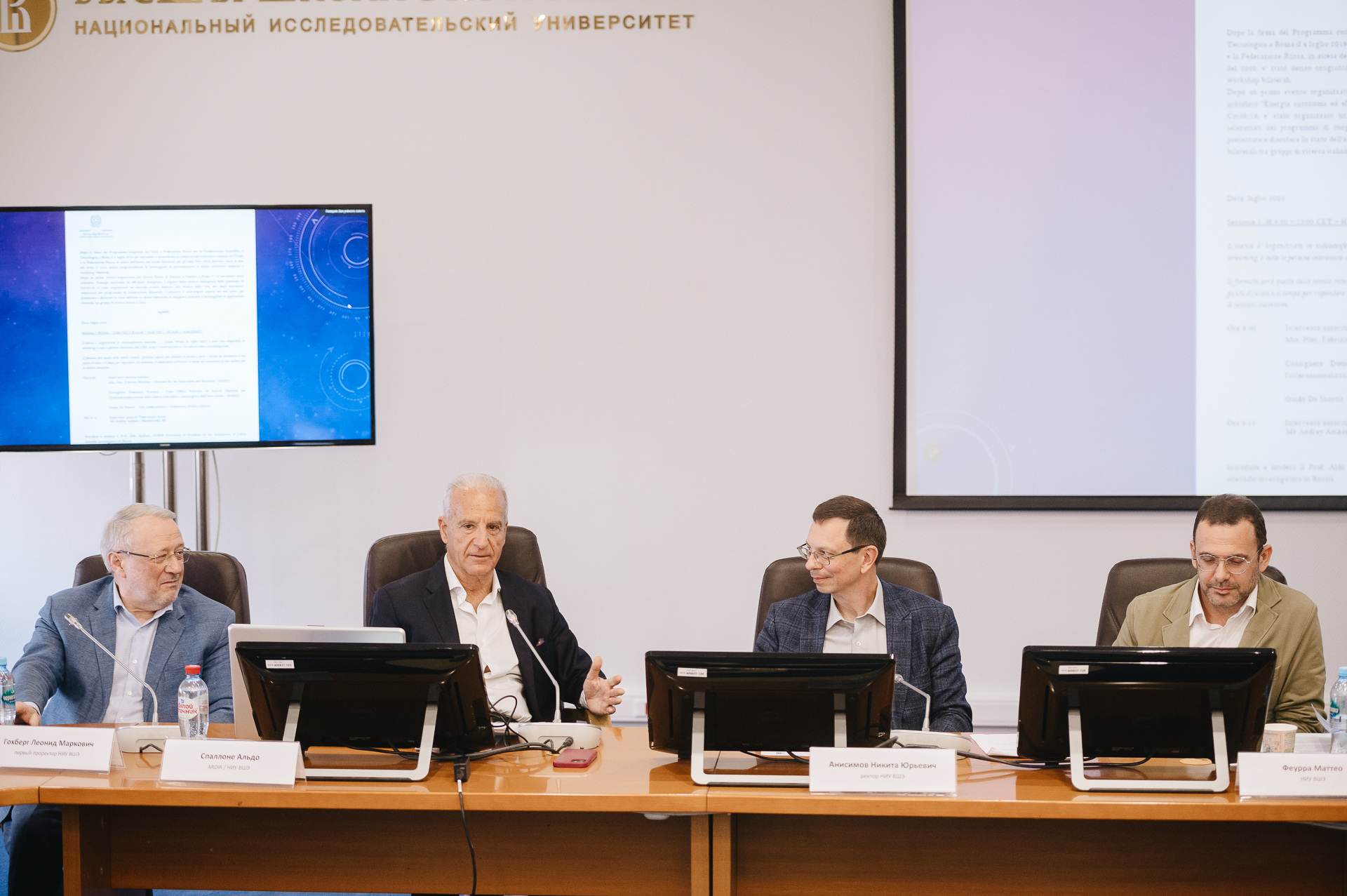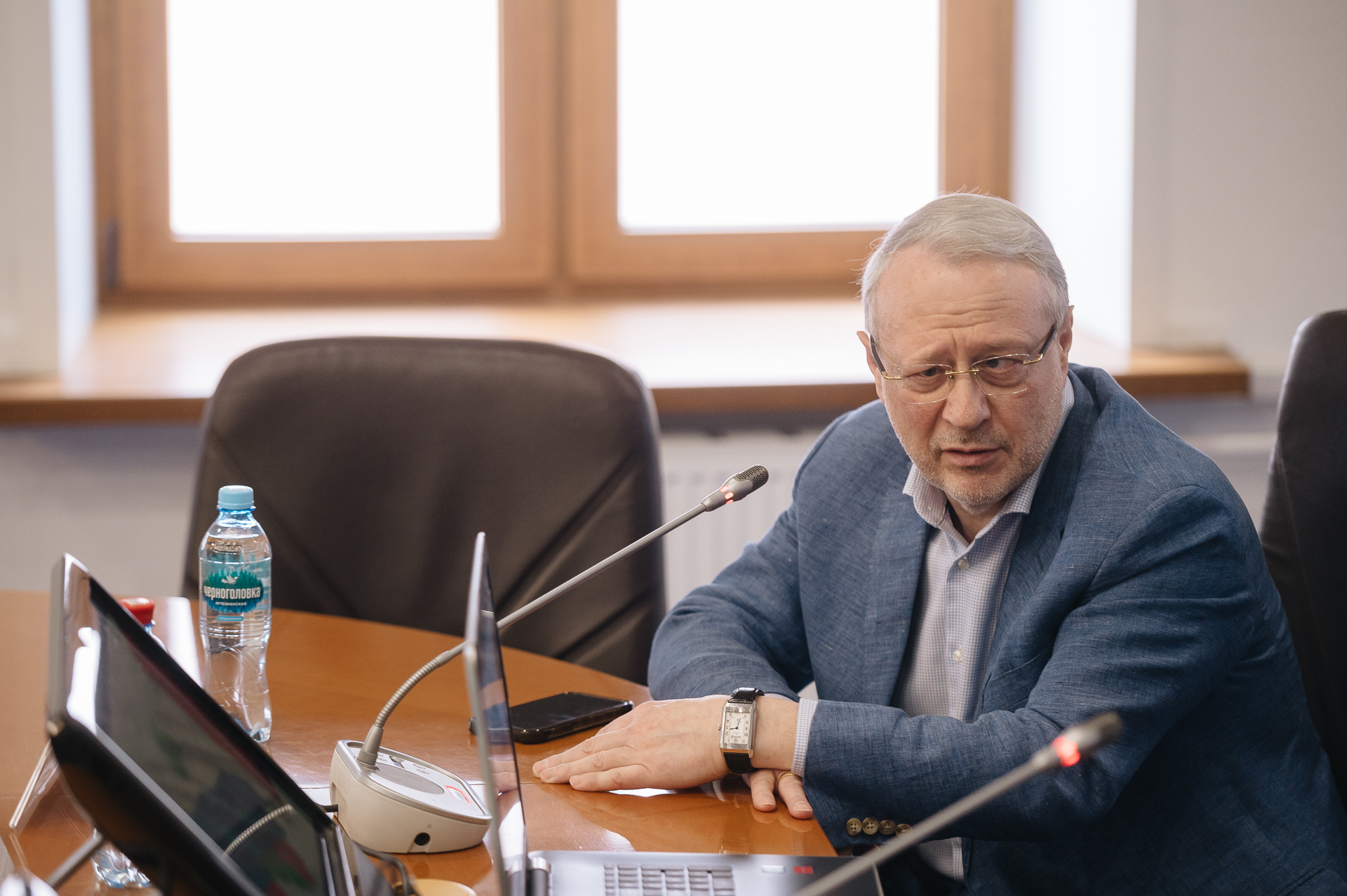Russian-Italian Projects in Biomedicine Discussed at HSE University
HSE University hosted an international mini-conference titled 'Search for new ways to develop Russian-Italian cooperation in the field of Biomedicine,' attended by scientists from both countries and HSE Rector Nikita Anisimov.
The international mini-conference ‘Search for new ways to develop Russian-Italian cooperation in the field of Biomedicine’ was co-organised by the Centre for Cognition and Decision Making of the HSE Institute for Cognitive Neuroscience and the Association of Italian Associate Professors in Russia (ARDIR). The conference was supported by the HSE Basic Research Programme and the Strategic Project 'Human Brain Resilience: Neurocognitive Technologies for Adaptation, Learning, Development and Rehabilitation in a Changing Environment' (ongoing in the framework of the Priority 2030 programme).
HSE University is open to cooperation with any international institutions, emphasised HSE Rector Nikita Anisimov in his opening remarks. 'We extend our invitation to prominent researchers, including early-career scientists from various countries. We can offer numerous opportunities for international cooperation, including “Human Brain Resilience,” a strategic project focused on neurocognitive technologies for adaptation, training, development, and rehabilitation, and implemented in the framework of Russia's Priority 2030 academic leadership programme. Today's event marks yet another step demonstrating our commitment to development, innovation, and collaboration,' he said.
Aldo Spallone, Research Fellow at the International Laboratory of Bioinformatics of the AI and Digital Science Institute, HSE University, spoke about the Association of Italian Associate Professors in Russia (ARDIR). The Association was established in 2020 upon the recommendation of the Italian Foreign Ministry and has had a positive impact on the relations between the two countries in the field of science.

Since the establishment of the Association, numerous prospective participants have shown interest in the opportunity to grow and develop alongside their Russian colleagues. This created a strong international connection, enabling scientists from both countries to share knowledge and expertise. Recent geopolitical events have caused many participants to take a break and reconsider their involvement in the organisation until better times. At the moment, we wish to inform all colleagues who are currently in Russia and carry out their work here that following a meeting with the Russian Ambassador to Italy (Alexey Paramonov - ed.), the Association will have the Russian authorities' support, allowing for more relevant cooperation with the world of science and higher education in Russia,' Aldo Spallone said.
HSE University positions itself as a global institution open to international scientific cooperation, stressed First Vice Rector Leonid Gokhberg. He noted, 'We are pleased that the Association has chosen our venue for today's seminar, and we look forward to continuing discussions here on our premises.'

The Russian-Italian conference continued with reports and presentations from participants. Anna Shestakova, Director of the HSE Institute for Cognitive Neuroscience, reported on the productive cooperation with Italian colleagues and also shared some of the results of her institute's work. As an example, she cited a recent study looking at how the choice of a foreign language can influence the learner's cognitive abilities. It has been found that languages dissimilar to one's native language stimulate cognitive function at the initial stage of learning, whereas those similar to the native language have a delayed effect, helping the learner's brain perform better once a higher level of foreign language proficiency has been achieved.
Matteo Feurra, Leading Research Fellow at the Institute for Cognitive Neuroscience, presented the project 'Improving Cognitive and Motor Function through Non-invasive Brain Stimulation.' The project involves Italian graduates of the Institute who continue their careers as scientists at HSE University.
Olga Buivolova, Research Fellow at the HSE Centre for Language and Brain, spoke about the activities of the Centre led by Professor Olga Dragoy. The areas of work carried out by the International Laboratory of Bioinformatics of the Institute of Artificial Intelligence and Digital Sciences were presented by Maria Poptsova, Head of the Laboratory. Ksenia Panidi, Senior Research Fellow at the Centre for Cognition and Decision Making, contributed to the discussion by highlighting the use of transcranial magnetic stimulation (TMS) in neuroeconomics research.
Prof. Jubin Abutalebi, MD, PhD, at the Centre for Neurolinguistics and Psycholinguistics (CNPL) of San Raffaele University, Italy, spoke about language control and about cooperation between Moscow and Milan.
Following the event, a round table was held to discuss the prospects for developing joint scientific projects involving scientists from both countries.
See also:
HSE Scientists Reveal What Drives Public Trust in Science
Researchers at HSE ISSEK have analysed the level of trust in scientific knowledge in Russian society and the factors shaping attitudes and perceptions. It was found that trust in science depends more on everyday experience, social expectations, and the perceived promises of science than on objective knowledge. The article has been published in Universe of Russia.
HSE Scientists Optimise Training of Generative Flow Networks
Researchers at the HSE Faculty of Computer Science have optimised the training method for generative flow neural networks to handle unstructured tasks, which could make the search for new drugs more efficient. The results of their work were presented at ICLR 2025, one of the world’s leading conferences on machine learning. The paper is available at Arxiv.org.
Neural Network Trained to Predict Crises in Russian Stock Market
Economists from HSE University have developed a neural network model that can predict the onset of a short-term stock market crisis with over 83% accuracy, one day in advance. The model performs well even on complex, imbalanced data and incorporates not only economic indicators but also investor sentiment. The paper by Tamara Teplova, Maksim Fayzulin, and Aleksei Kurkin from the Centre for Financial Research and Data Analytics at the HSE Faculty of Economic Sciences has been published in Socio-Economic Planning Sciences.
Larger Groups of Students Use AI More Effectively in Learning
Researchers at the Institute of Education and the Faculty of Economic Sciences at HSE University have studied what factors determine the success of student group projects when they are completed with the help of artificial intelligence (AI). Their findings suggest that, in addition to the knowledge level of the team members, the size of the group also plays a significant role—the larger it is, the more efficient the process becomes. The study was published in Innovations in Education and Teaching International.
Advancing Personalised Therapy for More Effective Cancer Treatment
Researchers from the International Laboratory of Microphysiological Systems at HSE University's Faculty of Biology and Biotechnology are developing methods to reduce tumour cell resistance to drugs and to create more effective, personalised cancer treatments. In this interview with the HSE News Service, Diana Maltseva, Head of the Laboratory, talks about their work.
Master’s Students of HSE, University of Campinas, and Tsinghua University Publish Joint Student Research Collection
Master’s students of the HSE ISSEK programme ‘Science, Technology and Innovation Management and Policy’ have released a joint research collection with the University of Campinas (Brazil) and Tsinghua University (China) titled ‘Being Innovative or Being on the Safe Side—Managing the Risk of Failure.’ The authors explore how organisations perceive risks and embrace innovation within different cultural contexts.
‘A Turn Away from Stereotypes’: Moscow Hosts ‘Researching the Deaf Community’ Conference
On October 17–19, 2025, the third annual interdisciplinary conference ‘Researching the Deaf Community 2025: on the Periphery of Attention’ took place at GES-2 House of Culture in Moscow. The event was organised with the participation of the HSE International Laboratory for Social Integration Research. HSE University Vice Rector Irina Martusevich addressed attendees at the opening ceremony.
Exploring the Mind: HSE Scientists Discuss Cognitive Technologies of the Future
Why we make irrational decisions, how the brain responds to fakes, and whether neural networks are capable of thinking—these were the topics discussed by early-career scientists of HSE University during the NAUKA 0+ science festival. The event brought together students and experts from various fields, united by a common goal—to deepen their understanding of the human brain and cognitive technologies.
HSE Researchers Assess Creative Industry Losses from Use of GenAI
Speaking at the IPQuorum.Music forum on October 15, Leonid Gokhberg, HSE First Vice Rector, and Daniil Kudrin, an expert at the Centre for Industry and Corporate Projects of HSE ISSEK, presented the findings of the first study in Russia on the economic impact of GenAI on creative professions. The analysis shows that creators’ potential losses could reach one trillion roubles by 2030.
International Dialogue on Urban Development: Dynamic Urbanism and Green Infrastructure
In September 2025, the HSE Faculty of Urban and Regional Development (FURD) hosted a delegation of leading scholars and urban development experts from China. Two seminars were held at the Shukhov Lab with the participation of Chinese colleagues: the first focused on green infrastructure, while the second explored the theme of dynamic urbanism. In addition, a meeting between the Chinese delegation and representatives of FURD took place at the university’s main building on Pokrovsky Bulvar. The participants discussed opportunities for expanding cooperation between universities and research centres.


